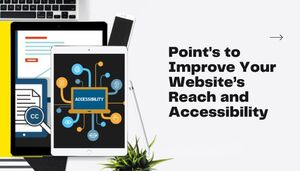How to Improve Your Website’s Reach and Accessibility?
الجسم
The web is changing at an ever-increasing pace. Going from a desktop to a laptop and then from a laptop to a tablet, there’s never been so many devices and outlets for digital connectivity. But one major thing is for sure: web accessibility has never been more important!
Web accessibility is a key part of our digital strategy, and we are committed to making sure that everyone has access to a solid digital presence to bring optimum website reach and boost traffic as well as to run a successful business.
A highly accessible website is a vital part of the digital transformation since it empowers everyone to fully experience their online shopping. So you better make sure you have it right!
Good web accessibility created diverse opportunities for visitors to access key information about your products and services, and other online pages encourage visitors to convert.
Is there a significant bar that companies often overlook? A website's accessibility. In fact, there are approx 51.4 errors per home page. So, when it comes to building a website that can meet all accessibility requirements, there are some basic statistics you should know.

In 2023, there were an estimated 1 million web pages with over 49,991,225 specific accessibility errors found. That’s over half of all home pages.
It has been observed that nearly 26% of the images displayed on home pages do not have alt text.
Over 51.4 errors per home page on average, with 86.4% having low-contrast text as the main accessibility issue. One of the most frequently encountered accessibility problems is low-contrast text, which does not meet the WCAG 2 AA requirements.
Since 2022, the number of accessibility barriers detected by WAVE has decreased by 1.6%, resulting in a positive impact on end-users. This decrease has also led to fewer high Web Content Accessibility Guidelines 2 Level A/AA conform failures.
What Is a Solid Website Accessibility Policy?
Website accessibility is the practice of building and keeping a website's performance in a way that people of all abilities can access and interpret the information. That means making sure that the details on your website can be accessed and understood by anyone, using proper H1 & H2 tags, or looking at your website.
Learn about how to make your website more accessible, and what you can do to help people with their online activities.
The Guidelines on How to Make Your Website Accessible Are Outlined Below.
Good Perceivable : perceivable content and web structure design could make better perceptions of every aspect to the visitors. It builds confidence in users' minds to make their purchase decision.
Easy Operable : a website design should be as convenient as your UI design, and navigation could not pose negative impressions and support high bounce rates.
User-friendly : Your website design should be user-friendly, so users can come and visit, and confidentially make their buying decision.
Scalable : Your website's content is an exponential design and placed in a way where users can interpret properly what they are going to receive and what benefits they will get from it.

Moreover, every website visitor should be happy and engaged, and accessibility plays a role in that to increase website traffic.
1. Integrate With a CMS to Supports Easy Accessibility :
A content management system (CMS) most important part of Perfect Web Design to build a higher user experience and increase website traffic.
It helps to make user-friendliness features.
Easy & fast deployment.
Ease of maintenance and supports.
Impose quick updates when required.
Cost-efficiency solution by giving out-the-box theme ideas.
Extendable plugins and extensions.
SEO-friendly elements.
2. Helps in Structuring Headers :
Proper use of headers on a webpage can effectively structure and organize the content, making them a valuable resource. All users can effortlessly browse through your web pages, and it also increase website traffic through quality SEO score, leading to more conversion on your site.
3. Alt Tags Are a Must for Images :
Are you using descriptive alt tags for your website's images? If not, consider adding alt stages for all images to help search engines and users. Describe the images in a way that screen reader users can understand them. Alt tags are essential for improving your SEO score on search engines.
Did you know? To aid those with limited vision and/or mobility, we recommend adding an alt tag to images on your website.
4. Use Descriptions Title for Making Links :
When it comes to creating links on your webpage, including descriptive titles for each of them will make it easier for those who rely on screen readers to navigate your website.
Good link descriptions allow screen readers to boost Website Reach and increase website traffic more efficiently.
5. Choose Colors Carefully :
Colors play an important role in website design. Dull or boring colors drive your visitors with high bounce rates, whereas, confusing colors give a negative perception of your brands.
Furthermore, if you have a navigation bar on your site and it contains various elements, it is important to label these elements so that the user can easily navigate through them. For example, if one of these elements is a call-to-action button that takes the user to another page, you must specify which page you are referring to. This will also help users who have a disability, such as color blindness/low vision.
RESOURCE URL : https://www.vingle.net/posts/6553113











تعليقات